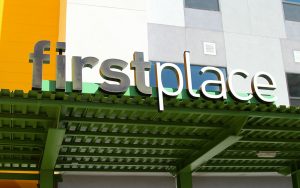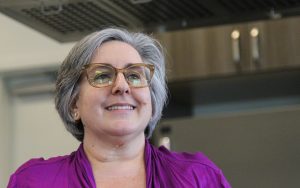PHOENIX – For years, adults with autism could only dream of finding housing that would help them live independently in the Valley. Now that dream is turning into a reality with increased awareness about housing opportunities and needs.
First Place in Phoenix offers supportive housing for adults with autism and Down syndrome or who are neurodivergent.
The 81,000-square-foot property combines apartments, a residential training program and a global leadership institute. The $15.4 million project injected a new life and awareness of autism housing issues into the city. Before the grand reveal of First Place, there wasn’t much to help people with autism find housing.
First Place also offers a residential transition program for adults with autism, one that William Hendrey is familiar with. Hendrey was diagnosed with autism as a kid and lived in Illinois, Virginia and then Arizona. His mother, Michelle Hendrey, was almost certain of what her life would be like with a child with autism.

First Place opened a residential building in 2018 for adults with autism and Down syndrome or who are neurodivergent as a response to the lack of housing for neurodiverse populations. (Photo by Hayden Cilley/Cronkite News)
“I thought he was going to be with us forever,” Hendrey said. “I thought he was going to live out all of his days with us, which kind of scared me because what happens when my husband and I pass away?”
Nonetheless, she relentlessly tried to make sure her son was treated equally in society. Nobody knew that better than William’s teachers: Hendrey made sure her son had the same opportunities as his classmates.
“I was very vocal in the school district when he was in elementary school. It got to the point where I’d go to the school board and they’d say, ‘OK, Miss Hendrey, what do you want now?’” Michelle Hendrey said, chuckling. “They knew who I was, but I was really an advocate, I was really fighting, and I was very boisterous.”
Her drive for an equal opportunity for her son instilled the same drive in him, as he was one of the first residents in the First Place Transition Academy. The program, which includes housing and lasts two years, teaches skills, such as budgeting, planning and management – life skills that often people take for granted. William Hendrey vividly recalled the experience of transitioning from living at home to living on his own.
“My mom had been waiting for a while to hear from the people who tried to get me into this,” Hendrey said. “She had a hard time getting the money, which is where a relative of hers came in.”
According to the Greater Phoenix Housing Market Analysis from the First Place Global Leadership Institute, 55% of respondents said they would be interested in a transition academy to bridge the gap between a family home and independent living – but 45% said they would be interested only if there was assistance covering the cost. A one-bedroom apartment at First Place costs $4,400 a month, or $52,800 a year, before taxes. Hendrey enrolled in the transition academy and gained skills he didn’t know he needed, especially dealing with noise.
“I tried to have at first a sound machine, but that somehow didn’t work out for me. … During the construction at First Place, there was going to be soundproofing the walls, but they said no,” Hendrey said. “No joke, no drama.”
Denise Resnik co-founded Southwest Autism Research and Resource Center in 1997 and then launched First Place in 2012, with the residential building opening in 2018. As a mother to a son with autism, Resnik knew the magnitude of founding First Place and the needs of housing for neurodiverse populations.
“Without housing options, this population lives with family members until crises force rushed placements or even homelessness. These consequences are both traumatic for the individual and their family and expensive for our state and communities,” Resnik said in a news release.
“Lack of housing options too often prevents the neurodiverse population from moving beyond their family home as integrated, contributing members of society with the support of those who know them best.”

Maureen Casey, the First Place director of Global Leadership Institute’s Centers for Applied Research and Public Policy, talks about the skills taught in the First Place Transition Academy, such as budgeting, planning and management. Photo taken in Phoenix on March 23, 2023. (Photo by Hayden Cilley/Cronkite News)
First Place’s employees are committed to helping those who have autism or are neurodiverse. One of those employees is Maureen Casey, the director of the Global Leadership Institute’s Centers for Applied Research and Public Policy, who organizes programs to help First Place’s residents.
“Folks go to Gateway Community College and they take our ‘Learn for Independence’ curriculum and they learn about ways that they can be safe in the community, how to prepare for employment and how to deal with things like household and personal management,” Casey said.
After learning those key skills and concepts, Hendrey graduated from First Place’s transitional academy and moved to Spectrum Courtyard, which is for people with developmental disabilities, with an emphasis for people with autism. The move was not as easy as he thought it would be. From a financial standpoint it was doubtful that he would finally be able to live on his own, as home prices in 2021 were 22% higher than the year prior, and over the first six months of 2022, prices rose another 24%, according to Common Sense Institute Arizona.
Despite the uncertainty, the former First Place Transition Academy graduate made the move nearly 15 minutes north. Hendrey knew exactly what to look for in his next place to live: “Somewhere quiet. Somewhere where the people are friendly,” he said.
Hendrey found the environment of Spectrum Courtyard to be friendly almost immediately upon his arrival. With his caregiver, provided through the apartments, Hendrey does activities like going to the store once a week and keeping his home clean.
When leaving First Place, Hendrey took the lessons he learned and applied them upon arriving at Spectrum Courtyard. He found a job shredding documents with Beacon Group, a company designed to employ people with disabilities and teach them about independence and working as a team in a work setting.
His mother thought that her son living with her as an adult would be a full-circle moment, but it was quite the contrary.
“As long as my husband and I are alive, I’m fine because we know that if something happens to this building, he can always come back with us,” Michelle Hendrey said of Spectrum Courtyard. “With this place here, I have no concerns. This is a very nice place. He loves living here.”
But she recognizes the overarching problem with housing for those with autism, especially when it comes to people with autism being treated as equals.
“It’s becoming more and more common for people to be on this spectrum; we’re going to need more housing,” Michelle Hendrey said. “If the autistic people are treated well, they’re going to be contributing members of society. We’re not going to lock them away in an institution. They can help out.”



